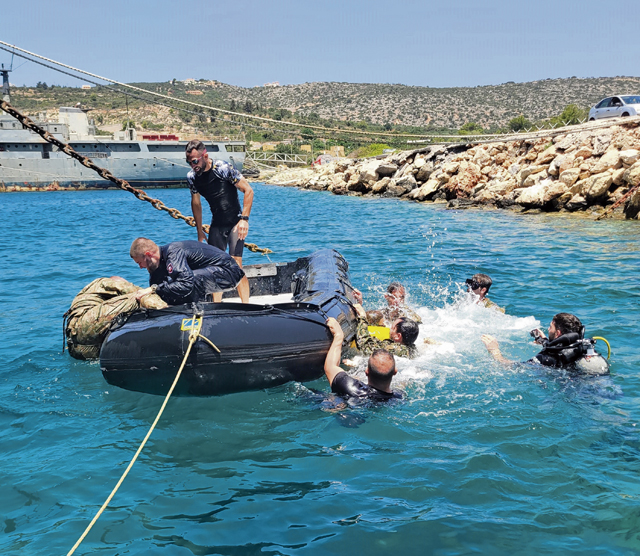
SOUDA BAY, Greece – Two Soldiers from Landstuhl Regional Medical Center (LRMC) had the opportunity to take part in maritime medical combat training in Greece June 3 to 14. The weeklong training event was held at the NATO Maritime Interdiction Operational Training Center (NMIOTC) in Souda Bay, Greece.
Sgt. 1st Class David Shrewsbury and Staff Sgt. William White from LRMC were among a group of more than 20 military medics from several NATO countries taking part in the training. Among the participants were medics from The Federal Republic of Germany, Slovenia, Latvia, Italy, Hungary, Greece, and the Netherlands.
“The primary goal of the training was on medical combat care in a maritime environment with a focus on prolonged field care,” said Sgt. 1st Class David, Shrewsbury, non-commissioned officer in charge of patient care services at LRMC. “With the Army shifting its focus to large scale combat operations, it is important to consider the impact of not having that “golden hour” regarding casualty evacuation will have on the survivability of critically injured casualties.”
According to NMIOTC officials, the goal of the course is to integrate medical personnel skills and knowledge in performing the necessary pre-hospital emergency medical assistance on the site, starting from the point of injury in the mission/theatre until the final transfer of the injured personnel to the closest medical treatment facility, in support of the maritime operations.
“We need to be able to focus on doing the best we can with the supplies we have on-hand and enable our combat medics to practice critical thinking and make tough choices,” added Shrewsbury. “Practicing this now will make us more effective if and when the need arises.”
According to senior military medical officials, conducting tactical combat casualty care and patient evacuation in a water-borne environment creates additional stresses and challenges for those individuals responsible for performing the task.
“The most challenging part of the training was the final field training exercise,” Shrewsbury added. “The field exercise lasted seven-plus hours from start to finish in 100 plus degree weather. We had to carry heavy supplies while wearing body armor, move around in small spaces, and navigate a chaotic environment without knowing when it would be over. Managing all aspects of patient care and evacuation, to include triage, medications (some of which needed to be kept at specific temperatures), and other supplies while setting up and working ropes and pulleys to extract casualties was both mentally and physically taxing.”
In addition to combat casualty care, the weeklong course is also designed to refine individual tactical awareness, medical competencies, interoperability, and operational planning capabilities.
“The course served as a blatant reminder that we are all Soldiers first, and that while we may each specialize in a particular craft, our skill sets should be well rounded,” said Staff Sgt. William White, non-commissioned officer in charge of the Landstuhl Regional Medical Center Dermatology Clinic. “This course was, by and large, the most impactful training event of my nine-year Army career. Having the chance to work and learn jointly with members of allied nations was an excellent opportunity.”


